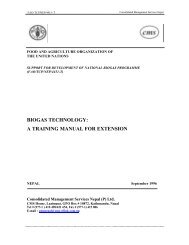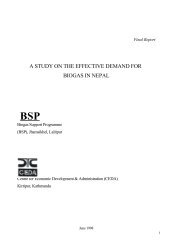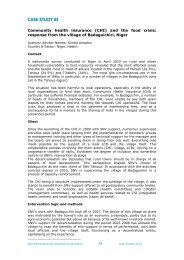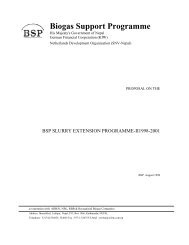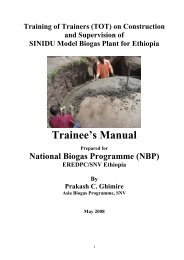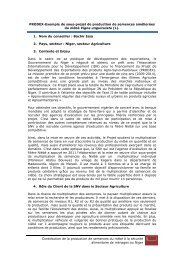School Priorities - SNV
School Priorities - SNV
School Priorities - SNV
Create successful ePaper yourself
Turn your PDF publications into a flip-book with our unique Google optimized e-Paper software.
Quality Education<br />
Teachers are now asking for more needsbased<br />
training. MOSIQE has reignited their<br />
love of teaching. They can see how this<br />
project builds upon and acknowledges their<br />
existing knowledge and skills, while further<br />
developing their professional effectiveness.<br />
Based on the positive feedback, <strong>SNV</strong><br />
shared its experience with other districts,<br />
organising exchange visits for district<br />
officials and PTC staff to visit the project<br />
in Bukedea and sending the University<br />
of Amsterdam experts to PTCs in Mbale,<br />
Kapchorwa and Kumi, where the visits<br />
created an excitement about the project.<br />
The two core PTCs in Mbale and Soroti,<br />
which cover multiple districts with their<br />
CCT support services, are taking the lead.<br />
Through its partner, Child Fund, <strong>SNV</strong><br />
coordinated the purchase of two low-cost,<br />
easy-to-use video cameras and trained<br />
selected Mbale and Kumi District and PTC<br />
staff in video documentation so teachers in<br />
these districts could evaluate their own and<br />
each other’s teaching practices. The districts<br />
have even increased the scope of the project<br />
to deal with their particular needs, using the<br />
cameras to identify problems and monitor<br />
progress in other areas, such as school<br />
infrastructure and community participation.<br />
Embassy, is institutionalising MOSIQE as<br />
part of its teacher mentorship programme,<br />
starting with the Mbale and Soroti core<br />
PTCs.<br />
As these programmes move forward, CCTs<br />
and district inspectors must work closely<br />
together. Merely videotaping teachers<br />
does not improve teaching quality unless<br />
they also get support in resolving their<br />
individual weaknesses. Teachers can<br />
continuously improve only when they study<br />
their own practices and see the results<br />
in the classroom. <strong>School</strong> leadership is<br />
critical in this process; CCTs should work<br />
to strengthen headteachers’ capacity to<br />
support teachers’ professional development.<br />
This initiative has demonstrated that the<br />
role of the teacher in the education process<br />
is evolving. To make teaching “learnercentred”,<br />
a teacher must become a facilitator<br />
in the classroom, helping students to learn<br />
independently. The videotaping programme<br />
has helped many teachers to better see their<br />
new roles as facilitators. <br />
For more information, contact<br />
Transform Uganda, Kumi<br />
Other education actors are taking notice.<br />
UNICEF, with support from the Dutch<br />
Lessons learnt<br />
• Developing partners and networking are critical to replicating projects, as is<br />
“selling” innovative, cost-effective ideas to others.<br />
• While identifying problems such as teacher and pupil absenteeism is important, it<br />
is more important to develop interventions such as the MOSIQE Project to turn<br />
these problems into opportunities for change.<br />
Suggestions for replicating the project<br />
• Document whether video-based professional development for teachers is ultimately<br />
improving student learning.<br />
• Ask children for their feedback on the effects of MOSIQE on the teaching and<br />
learning in their classrooms.<br />
18





